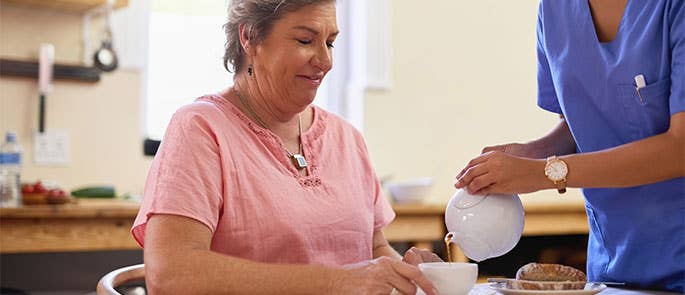Promoting Independence in Health and Social Care
Promoting independence in health and social care is an important part of the role for anyone working in a caring position. Independence empowers residents and patients to feel more in control of their lives, improves inner confidence and contributes towards their overall sense of wellbeing. Not only does this benefit the individual, but it also brings many benefits for health and social care facilities. In this article, we’ll look at what independence in health and social care means and why it’s important to promote it, plus give you some great ideas for how to promote independence in your setting.
What is Independence in Health and Social Care?
Having independence in health and social care means having control over your own life and your own decisions when in a health or social care setting, whether it’s control over which food to eat, what activities to join in with or which care option to choose.
Independence means a person is respected as an individual, isn’t subject to the authority of someone else and is always given the support they need to voice their own preferences.

Autonomy is important in health and social care settings as, by their nature, these places can often make residents and patients feel as if they have little control over what’s happening to them. Independence enables people to maintain as much autonomy as possible whilst in these settings.
All residents and patients are individuals with their own, unique views, preferences and experiences – and they all deserve to be treated in this way. Even if the person has reduced capacity, they should still be given as much control as possible and promoting independence will help them to feel included, respected and empowered.
Why is Promoting Independence Important in Health and Social Care?
As well as helping people to feel more in control of their lives, promoting independence in health and social care settings brings many other benefits, to patients, residents, members of staff and the setting as a whole. Here are 10 reasons why promoting independence is important in health and social care:
- Under the Care Act 2014, all services should aim to keep people well and independent. Empowerment – including independence and person-centred care – is a key principle under the Act, making it a legal requirement as well as a moral one.
- Because independence increases wellbeing, confidence and autonomy, it has the power to delay future care needs, therefore reducing the burden felt by services and families.
- Independence enables a better quality of life for the individual, as freedom, confidence and better mental health means more sense of purpose and less chance of loneliness, as they are more likely to join in and continue to be social.
- Promoting independence in health and social care means that residents and patients are able to do things independently, which enhances their confidence, self-belief and self-image.
- Independence empowers residents and patients to have a say in their own care, support and treatment, make their own choices and have their voices heard. In turn, this enhances dignity and respect for the individuals.
- Increased autonomy means reduced dependency on staff and facilities in health and social care settings. If individuals can do as much as possible by themselves, the demands on carers and nurses are lessened.
- Independence can help to reduce or slow physical and mental decline. Keeping the brain active has been shown to improve wellbeing, alertness, memory and concentration.
- Promoting independence in health and social care reduces isolation and loneliness and increases a sense of belonging, as confident, independent individuals are more likely to take part in social activities. Loneliness in the elderly is shown to contribute towards further health problems, so it’s important that it’s avoided.
- Independence empowers people to feel in control of their health and wellbeing, making them more likely to take action if they feel unwell. Therefore, independence can act as a preventative measure against worsening illnesses and conditions.
- Independence reduces the chances of resistance to care. If patients and residents feel more in control of their life, they’re less likely to refuse healthcare assistance because they understand why it’s needed.

How to Promote Independence in Health and Social Care
Promoting independence in health and social care, whether it’s patients, elderly residents or people with disabilities, is closely linked with person-centred care. This means personalised care planning that focuses on each person as an individual and takes into account their particular needs and preferences. Our article on Why Person-Centred Care is Important will give you more guidance on this topic.
An easy way to promote independence is to enable the person to take part in activities and hobbies that they enjoy. For example, craft clubs, reading groups, gardening, watching TV or painting are all activities that most care settings are able to provide and which can bring patients and residents a lot of freedom and joy. Our article on Activities for Care Homes will give you some good ideas.
You should also promote independence by allowing the person to choose what they want to eat (or don’t want to eat), pick the time they want to eat (if practical) and select who they want to eat with (or decide if they want to eat alone). Additionally, enabling the person to have control over who they socialise with can be empowering for the individual.

In terms of a person’s healthcare, medication and support, promoting independence in care requires clear communication and active listening. Never assume that a person prefers a particular method of care or type of medication – always allow them to choose what suits them best wherever possible. Furthermore, all members of staff that care for the individual should be aware of the person’s individual preferences, so good communication between colleagues and care providers is essential. Our article on How to Improve Active Listening provides some great tips.
You can also promote independence in care by helping patients and residents to manage their own health and wellbeing. Alongside giving them control over their medication and support preferences, teach them about the importance of regular movement, a good diet, involvement in social activities and keeping their brain active. If a person is able to maintain their own health, they’re more likely to get better, have a better quality of life and even live longer.
Another idea is to help improve digital literacy amongst patients and residents. Technology plays an important role in modern day healthcare, so if residents and patients understand more about how to use it, they’ll feel more in control and more independent. For example, assistive technology and communication technology all enable a person to live more independently, but only if they fully understand how to operate them.
Promoting independence in health and social care is all about seeing the person as an individual, empowering them to make their own choices and helping them to do things for themselves. In turn, independence improves mental wellbeing, makes loneliness less likely, slows down physical and mental decline and gives a person more confidence and control over their lives. This is why promoting independence is so important for health and social care providers.
Further Resources:
- Introduction to Safeguarding Adults (Level 1)
- What is Person-Centred Care and Why is it Important?
- Using Technology in Health and Social Care
- Person-Centred Care Quiz
- 9 Ways to Help Promote Dignity in Your Care Home
- Risk Enablement: Making Safeguarding Personal











